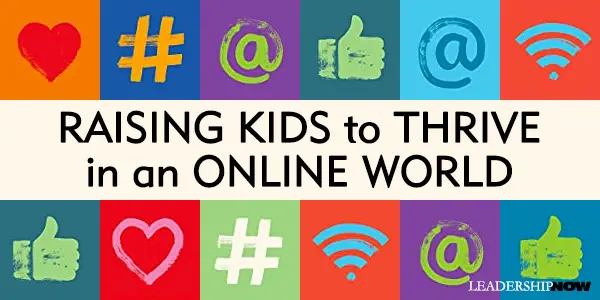 |
 |
07.30.21

Raising Kids to Thrive in an Online World
RAISING KIDS in the physical world is hard enough to get right, but now there is the added dimension of the digital world. While we spend a good deal of time preparing our kids for success in the physical world, Richard Culatta says, “we have put surprisingly little effort into making sure our kids are prepared to be safe and healthy” in the digital world. In Digital for Good: Raising Kids to Thrive in an Online World, Culatta writes that the “events that take place in the virtual world are not ancillary to their lives but are some of the most important elements in them.” For all the good the virtual world has to offer, it is also filled with wicked problems. Most of them stem from one fundamental flaw: we never took the time to establish the ground rules for meaningful participation. We have spent the last two decades excitedly finding ways to migrate all kinds of experiences to the digital world, but we haven’t stopped to ask how we will preserve our civil society as it also migrates there. For all the good the virtual world has to offer, it is also filled with wicked problems. Most of them stem from one fundamental flaw: we never took the time to establish the ground rules for meaningful participation. We have spent the last two decades excitedly finding ways to migrate all kinds of experiences to the digital world, but we haven’t stopped to ask how we will preserve our civil society as it also migrates there. With no expectation for acceptable behavior and near-complete anonymity, we have created an environment that is optimized for self-destruction. When we do try to teach our kids, our conversation about online safety is too limited, focusing on not sharing personal information, talking to digital strangers, or posting things they might regret later. We need to broaden the conversation “to articulate a broader, more meaningful vision for the use of tech to enrich our children’s lives.” And when we do have those conversations, we need to take a positive approach—not just a list of don’ts, but positive behaviors our kids can practice doing while in the digital world. Culatta, who is the CEO of the International Society for Technology in Education and the former Director of the Office of Educational Technology for the U.S. Department of Education, has developed a framework that we should use to guide our approach to teaching digital citizenship:
Using screen time as the primary factor for moderating tech takes away our children’s ability to learn to self-regulate. We want our kids to learn to move on to new activities when it is appropriate to do so, not just because a timer runs out. Change the conversation. Instead of saying you’re addicted to your phone, provide an example of a physical-world activity that isn’t getting enough priority. Culatta provides suggestions to reframe other common conversations like, “You’ve been playing that game too long,” Stop sitting around on the computer all day,” and You need to interact with real people.” And hold app reviews with your child.
Help them learn to identify useful information from junk. Emphasize asking better questions, selecting the best sources, and evaluating relevant answers. Helpful questions to ask are, “Can you validate the claims with another source?” “How old is the information?” and “Does the content us hyperbolic, alarmist, or emotional language?” Wikipedia never claimed to be a reliable source, but instead, it is a starting point to gather basic information for deeper learning journeys.
Mostly, algorithms “don’t just show us more of our same beliefs, but more extreme versions of those beliefs….It seems as if you are never ‘hard core’ enough for YouTube’s recommendation algorithm.” If we don’t prepare young people to understand how to value and respect multiple, opposing viewpoints, they may forfeit one of their greatest learning opportunities and, worse, treat people who hold opposing viewpoints disrespectfully. Of course, we have to model this in our behavior, even as outspoken individual, organizational, and governmental voices don’t.
Indexing projects “allow people worldwide to digitize important historical artifacts to make them searchable and discoverable online. There is an app that connects sighted volunteers to visually impaired people through their mobile devices. “If a blind person needs help with a particular task, say, reading the expiration date on a carton of milk or reading a phone number, they can connect with a sighted person through the app to have it read to them.” Additionally, they can help strengthen family relationships by connecting, capturing family experiences, and preserving family stories.
Culatta focuses on a positive approach that can be implemented now, even if you feel like the situation has already gotten out of hand. Young people will learn from our example. If we are to teach these positive behaviors to our children, it is assumed that we know them and practice them ourselves. All of this seems strangely helpful for adults to consider as well?!? Technology has no conscience—that’s our job. The same technologies that can solve our toughest human problems can also divide and destroy us with remarkable efficiency. 
Posted by Michael McKinney at 08:36 AM
|
BUILD YOUR KNOWLEDGE
 

How to Do Your Start-Up Right STRAIGHT TALK FOR START-UPS 
Grow Your Leadership Skills NEW AND UPCOMING LEADERSHIP BOOKS 
Leadership Minute BITE-SIZE CONCEPTS YOU CAN CHEW ON 
Classic Leadership Books BOOKS TO READ BEFORE YOU LEAD |